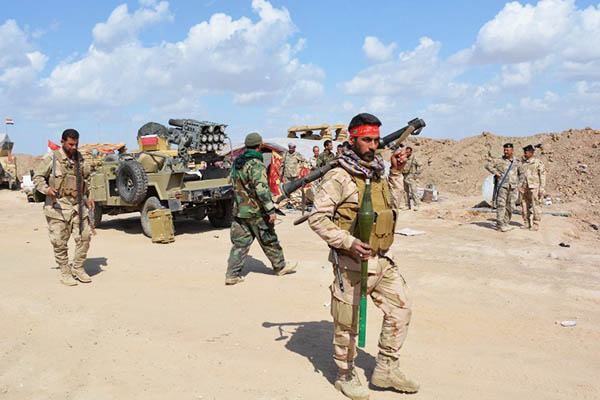
Younis Al-Bayati—AFP
Analysts say Shia militias have a good chance at succeeding, but security officials have cautioned against setting a timeline.
Some 30,000 Iraqi troops and militia backed by aircraft pounded jihadists in and around Tikrit in the biggest offensive yet to retake one of the Islamic State group’s main strongholds.
Government forces have battled their way north for months, notching up key victories against I.S., but Tikrit has been their toughest target yet, with the jihadists having resisted them several times. Commanders voiced hope the operation, launched Monday, would be a step towards the recapture of Mosul, the jihadists’ main hub in Iraq, although a U.S. envoy leading an international coalition against I.S. said no timeline should be imposed.
“The army, federal police, Popular Mobilization [volunteer] units, and the sons of Salaheddin’s tribes are performing the duties of liberation in the largest operation against Daish since June,” said a senior army officer on the ground, using an Arabic acronym for I.S. “We are certain of victory … but the operation is not easy,” the officer added.
The operation to retake Tikrit began early Monday after being announced by Prime Minister Haider al-Abadi the previous evening. Military sources said warplanes were involved, but the Pentagon said they excluded those of the U.S.-led coalition fighting I.S. It was unclear whether Iranian planes were involved, however.
Both Iraqi and Iranian media said Qassem Soleimani—the commander of the Al Quds Force covert operations unit of Tehran’s elite Revolutionary Guards—was in Salaheddin province, of which Tikrit is the capital, to help coordinate operations.
Hadi al-Ameri, the Popular Mobilization units’ powerful commander, on Saturday urged Tikrit residents to leave their homes within 48 hours so government forces could “wrap up the battle of the revenge for Speicher.”
Speicher is a military base near Tikrit from which hundreds of new, mostly Shia, recruits were kidnapped before being murdered execution-style in the early days of the I.S. offensive that swept through much of the Sunni Arab heartland north and west of Baghdad in June. Shia militias in particular have vowed to avenge the murders, sparking fears of mass killings against Sunnis if Tikrit were to be recaptured.
Some Sunni tribes have been accused of direct involvement in the Speicher massacre. Abadi urged the security forces to spare civilians, a message echoed by the U.N. and responding to the fears of reprisals. He appealed to residents to turn against the jihadists. “I call on all those who were misled and made mistakes in the past to lay down their arms today. This may be the last chance,” Abadi said, suggesting some could be granted amnesty.
I.S. replied with a video showing the execution of four men they said were Sunni Arabs belonging to a tribal group working against the jihadists near Tikrit. It also released pictures dated Monday that showed jihadists still manning checkpoints in Tikrit and Al-Alam.
Iraqi forces have tried and failed several times to wrest back Tikrit, a Sunni Arab city on the Tigris river. AKE Group analyst John Drake said the new assault stood a better chance of success because Shia groups had more resources and were less stretched, but warned of challenges. “It will also likely be difficult for the security forces to gain local intelligence on the ground,” he said, explaining residents may be unwilling to assist Shia forces or fear I.S. reprisals in the event of an inconclusive outcome.
The military commander for Salaheddin province, Abdel Wahab Saadi, said Tikrit had both symbolic and strategic importance. “The aim of course is to liberate Salaheddin to allow for the return of displaced families but it is also going to be a stepping stone on the way to liberating Mosul.”
However, a senior U.S. envoy said no timeline should be imposed on Iraqi forces’ planned offensive to take back the key city of Mosul, as the operation will require elaborate preparations. “We’ve got to be very careful and we need to resist trying to put a timeline on it,” said John Allen, the retired U.S. general appointed to coordinate the international coalition against the Islamic State group. “We just need to be ready when the time comes,” Allen said.
Tikrit is the hometown of executed dictator Saddam Hussein, the remnants of whose Baath party have collaborated with I.S. in attempting to topple the Shia-dominated government.
I.S. declared a “caliphate” in June straddling Iraq and Syria, where the U.S.-led coalition has also been conducting airstrikes but not coordinating with any significant ground force. The jihadist group has suffered a string of losses since Iraq’s foreign partners stepped up their support. Australia on Tuesday said it would send an extra 300 troops to help with training local forces.
A senior U.S. senator said American forces were specifically targeting Mohammed Emwazi, the London man dubbed “Jihadi John” believed responsible for videotaped executions of U.S. and other Western hostages in Syria. “Oh, yes. He’s a target. There should be no question about that,” former Senate Intelligence Committee chair Dianne Feinstein said.
